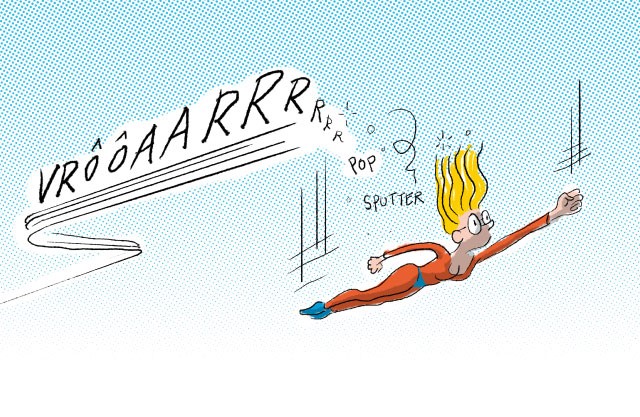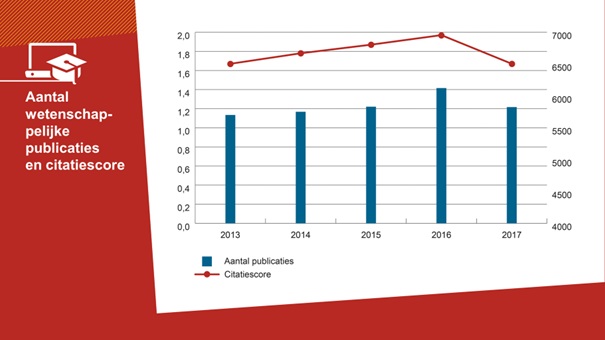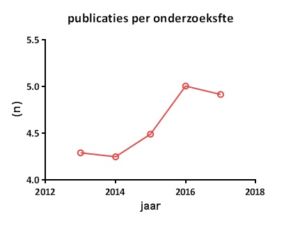Falling publication numbers and citation impact score: is that a problem?
-
 Illustratie: Roel Venderbosch
Illustratie: Roel Venderbosch
Was everything in college chairman Daniël Wigboldus' New Year's speech to be greeted with cheers? Not everything: the number of publications and citation impact score of Radboud University fell significantly in 2017. What could be the reason? Five questions and their answers.
After all the positive messages during the speech, that one sheet suddenly appeared, showing Radboud University’s numbers of publications and citation impact score. In 2017, numbers of publications fell from 6,124 to 5,825. A similar fall was seen in the citation impact score, a benchmark for the quality of study programmes, from 1.97 to 1.67.
Should we sound the alarm?
That would really be very premature. We cannot rule out the possibility that the fall in 2017 is a chance fluctuation. Although both the 2017 publication numbers and citation impact score were considerably lower than in 2016, they were pretty much the same as those of 2013. You could therefore just as easily assert that the figures have remained constant over a period of five years. The 2018 figures are not yet known.

Are these scores actually important at all?
The number of publications gives an idea of the scientific output of the university. That is certainly important, but it’s not the Holy Grail. Indeed, there has been some criticism in recent years about scientists publishing too much, resulting in some loss of quality in publications. There’s a good reason why Wigboldus stated in his speech that quality is more important than quantity.
In that sense, the citation impact score is more interesting. It indicates the frequency with which Radboud scientists are quoted by colleagues in relation to the international average. A score of 1.67 means that Nijmegen publications are quoted 67% more often than the average. You might interpret a fall in this score as meaning that Radboud scientists published fewer highly-acclaimed studies in 2017 than in 2016.

There is. In a response, Marijtje Jongsma, Radboud researcher and spokesperson for the science union VAWO, states in an email that the number of FTEs reserved for research fell significantly in 2017. According to Jongsma, ‘Taking into account the total number of FTEs for research staff, the number of publications has actually stabilised rather than fallen’. The accompanying graph supports her assertion. The fall in numbers of publications could therefore just as well be a direct result of a fall in hours spent on research.
Another interesting point: the fall in numbers of Nijmegen publications should not be viewed in isolation. The total number of publications by all Dutch universities fell from 75,537 to 74,269. as figures issued by university association VSNU show. This national fall concerns a fall in the Health and Behaviour and Society sectors in particular. There was much commotion in those areas in recent years, because many studies failed to meet the quality requirements of good research. That may have affected the numbers of publications. On the one hand, because researchers may have taken more time to safeguard the quality of their papers. On the other hand, because journals began making more demands, so getting published has become more difficult.
And what about the fall in the citation impact score then?
That’s more difficult to explain. The fact that it concerns a relative figure, in relation to the global average, may have something to do with it. If that global average increases, the Nijmegen figure will automatically increase. Even if the actual number of citations of Radboud publications remains unchanged. Jongsma: ‘I interpret this to mean that the Netherlands is failing to invest enough in the knowledge economy, which is why we are dropping towards the average.’
Nothing to worry about then?
Not immediately. Only when the figures fall over a long period, will the university have to take action, says university spokesperson Martijn Gerritsen. ‘Let’s see first how this fall further develops before we jump to conclusions’, says Gerritsen. ‘We will be monitoring the situation.’



